A year ago I published a letter from Charlene that explained her son had found his birth mother and they had all attended his college graduation. The reunion had gone so well that the son had decided to move to another state to live with his birth mom and get to know his biological family.
Charlene was happy for her son, yet also had many other emotions and was feeling confused by their coexistence.
That post resulted in a lively and helpful discussion. Charlene wrote in this week with an update, and she doesn’t mind that I share it with you. We both feel there is value in seeing what happens when a person has no choice but to trust the process (well, I suppose you can fight the process, but in adoption that rarely ends well).
Charlene’s Update
Hi, Lori.
It has been about a year since my son reunited with his biological family and moved thousands of miles away to another state to live with them. We visited him there twice and he was home last Thanksgiving briefly.
There were months when I doubted what my role was to him. On bad days I doubted if he thought I ever was his mom. On my good days I knew better. I never stopped encouraging him on his journey and being happy for him.
After 12 months there and feeling stalled in carving out a career path, he has decided to come back to his home here to figure it all out. He arrived this morning.
Our relationship with his biological family has grown and meshed and we are in a comfortable place, with respect, gratitude, and boundaries, many of them his. I am now fully able to acknowledge that he is my son and he is his birth mother’s son. He is going through life, like all of us, trying to figure it all out .
I can honestly say I’ve felt more these past 18 months than I have in a lifetime…
All my best,
Charlene
From Either/Or to BothAnd
Thanks, Charlene, for sharing your unique experience. You are further along in this parenting journey than I am and with this letter, you have taught me a little bit about letting go and about what truly binds people together.
From one of the comments on the original post: If he comes back to you, great. If he doesn’t, then you know that in his heart he was never really yours to begin with.
So…great. I suppose then we can infer that he was yours to begin with. While you have always claimed your son, now you know your son claims you, too.
The bigger point, however, is that expanded claiming has been taking place, to the benefit of your son. After your year of reflection and big emotions, you say he is my son and he is his birth mother’s son. You and your son’s birth family were open to making the shift from an Either/Or mindset to the BothAnd heartset, one that enables the adopted person to claim and be claimed by all his people.
I love how his birth mom’s family welcomed you, Charlene, as an extension of their love for him. I love how, now that he’s back with you, he can “keep” his birth family members, as well. You have all worked together to ensure that he doesn’t have to choose.
I’m sure there’s a lot more complexity to your year of emotional upheaval than you mentioned in your letter, but I am thrilled to know that as for the broad strokes, you all were able to keep your beloved son at the center of your intentions.
And that sometimes, trusting the process works out just beautifully.
Read Also
- So Many Emotions About My Son’s Adoption Reunion
- My Son Wants to Live with His Birth Mom. Now What??
- Returning to the Well
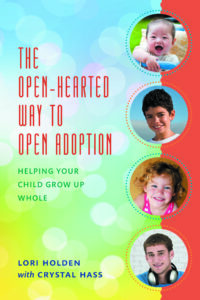
Lori Holden, mom of a young adult daughter and a young adult son, writes from Denver. She was honored as an Angel in Adoption® by the Congressional Coalition on Adoption Institute.
Her first book, The Open-Hearted Way to Open Adoption: Helping Your Child Grow Up Whole, makes a thoughtful anytime gift for the adoptive families in your life. Her second book, Standing Room Only: How to Be THAT Yoga Teacher is now available in paperback, and her third book, Adoption Unfiltered, is now available through your favorite bookseller!
Find Lori’s books on her Amazon Author page and catch episodes of Adoption: The Long View wherever you get your podcasts.

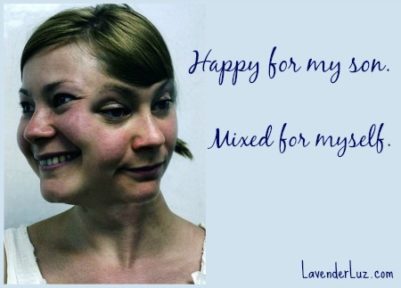
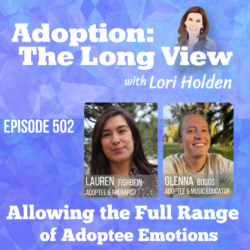
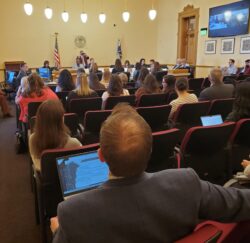
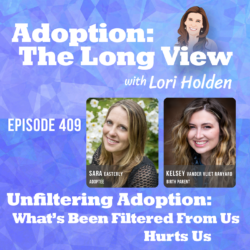

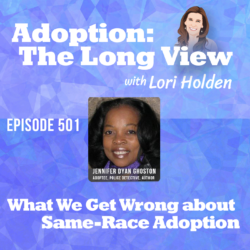
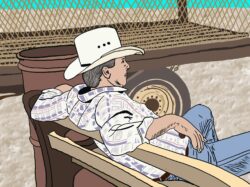
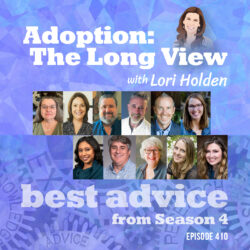
36 Responses
I’m so glad you updated about this. I’ve been wondering about this.
I, too, was happy that Charlene let me know how things had developed.
So nice to read this. How wonderful for her son to have two mothers who are devoted to his best interests, and put their own egos aside. It must have been terribly difficult for her.
I have to say I didn’t like the comment “if he doesn’t come back, he was never yours to begin with,” because I don’t think children belong to their parents, adoptive or natural.
Excellent point about ownership, Mali.
I was going to say the same. That almost took the joy out of the article as “yours” implies owner. “He is your son” however just speaks to the relationship.
I’m very glad you had this update
It’s great hearing an update from this “year of big feelings” on all sides. My daughters, now in their 30s, have both said they were glad to have been spared the anxieties and complications of a reunion in adulthood. They have known their extended birthfamily since they were little. I too am glad that I had years to “practice” and get a grip on my insecurities and feelings. Had their original family not been consistently welcoming and and forthright with me, it would have been a lot harder.
Even so, making the transition from relationships mediated by parents to relationships among adults is complex. I’m still learning about that spiral of understanding, where people process the same adoption information at different levels as they mature.
One of my daughters told me recently that her birth grandmother had tried to get custody of her as an infant (long before she came to us). It took her aback a bit and made her think about the alternative life she might have led if circumstances were different. The thing is, her grandmother had told me that the day we met 25 years ago, and I had mentioned it to my daughter periodically over the years. I wanted her to know she had been wanted and loved from the get go. It never sank in for her until she heard it as an adult, from the source.
I hadn’t thought about an open adoption as a place to practice dealing with our own insecurities, but it certainly fits. I’d prefer to process things gradually over time than suddenly in one big blast.
So interesting that the message source had so much to do with the message penetration. Thanks for sharing your family’s experiences with us, Bluepoint!
Beautiful how this family has expanded! I’m sure it’s complicated and messy at points, too…but isn’t every family?!
Yes! Beautiful messes are what loving families are made of.
Visiting from Microblog Monday.
Uh, great. Thanks.
Lori, thank you for sharing this story that highlights the importance of letting adoptees seek out and bond with their roots. I’m pretty sure I’m the one that made the comment you’re referencing from the original post. I stand by it. As an adoptee, it gives me some peace of mind to know there are adoptive parents who are secure enough to make room for the “both/and.” I didn’t have that luxury. Instead, my adad told me that if I attended a college that my bmom had suggested, then “she could just pay for it too.” Money, power, and control….
Anyway, I’m very happy for the Amom that wrote in and especially happy for the adult adoptee. He has been released from obligation and has the freedom to chart his own course.
I cannot imagine the difficulty in growing up in an Either/Or situation like you describe.
I really love your last sentence. I think too often we adoptive parents get stuck in Control Mode, forgetting that at some point our sons and daughters will be in control of things, including their relationship with their birth parents — and with us.
It’s a good reminder you’ve given us 🙂
I really do love the note, and it’s applicable to everyone. Parents don’t own their children; they raise their children. And raising them means releasing them a little bit at a time until the day they go out in the world and take care of themselves. Most of us will always need our parents — for advice, financial support, a space where we are loved unconditionally — but every kid needs to get the message that it is okay to follow their heart and do what they need to do to be happy.
“a space where we are loved unconditionally” — yes, this.
I cannot imagine the difficulty in growing up in an Either/Or situation like you describe, Jackie J.
I really love your last sentence. I think too often we adoptive parents get stuck in Control Mode, forgetting that at some point our sons and daughters will be in control of things, including their relationship with their birth parents — and with us.
It’s a good reminder you’ve given us 🙂
Thanks to you and Charlene for completing the story for us. It reinforces my current practice of reassuring my daughter that she has two mothers, always.
Beautiful, Margaret.
I’m struggling with some of the vocabulary in some statements.
First the word “claimed” it makes me feel like an object or belonging, not a human being. The thought my parents claimed me fits right in with the entire unnatural part of adoption. I wouldn’t prefer to say I claim my adoptive parents or biological parents either.
The young man may have come home simply because it was home and his parents are loved. I don’t think his actions one way or the other is making an official claim about who his true parents are or who is loved more. I can’t seem to know his true feeling but maybe he simply wanted to be back in his most comfortable place. It’s possible he wasn’t looking for “better”or “different”, just simply wanting to know. Of course at that age kids sometimes have other agendas. Maturity usually brings the “Aha my parents aren’t so bad” moments.
What a beautiful gift to give your adoptive child. Giving them the freedom to search who they are without guilting them, without placing your insecurities upon them. A child will always come back to unconditional love.
In regards to if he doesn’t come back he was never yours to begin with” he wasn’t the adoptive parents to begin with. He was his bio parents. They made a decision to place him up for adoption, therefore allowing him to have a second set of parents. He then became a child of both couples. Whether he went back or not has nothing to do with ownership. So I feel like the comment is irrevalent. Initially no, he wasn’t their son, but reality is he very soon became the son of both of them. Again these statements and words describe ownership. If we use them in regards to love and the heart maybe I’d have a different feeling. Perhaps you mean he is claiming them in his heart as his parents. Perhaps the statement is also another way of saying ” if he doesn’t come back he never truelly loved you as his parents”. If I left my parents and didn’t return it would have had nothing to do with where I belonged in the beginning. It would have everything to do with where I belonged today.
This is my interpretation, my opinion only.
So great to see you here, Andrea!
Please tell me a term that would make you feel belonging but not being owned. I’d heard that “claiming” made some adoptees feel connected but not owned, and I’d like to know if there are other terms that are appropriate.
As for the son’s motivations, I was thinking how interesting it would be to know how this all seems to him. I’m fascinated by different views of the same situation (e.g. https://lavenderluz.com/2009/09/festival-marnis-version-2.html)
I like what you’re saying with ” If I left my parents and didn’t return it would have had nothing to do with where I belonged in the beginning. It would have everything to do with where I belonged today.”
When can I actually see you??
I’d really love to get to Colorado soon. My grandaughter is stealing all my time ? Hopefully soon because I really feel like spending time with you. I had planned on Spring but it’s hard to leave because I provide day care for her.
I can only speak for myself so I’d have to think about it more. These thoughts and emotions are so rare nowadays. I suppose the word claim could be a word that makes adoptees comfortable in the reference to claiming your patents as your own. Maybe I think to literally. If my upbringing or adoption experience was different I might be fine with it also. I think it’s not comfortable hearing the word claiming when used by adoptive parents. Gosh you guys can’t win can you. I went back and reread your sentence and I can now see you are speaking from the heart. Meaning I’ve always accepted him as my son?? Sometimes words and meaning can be tricky especially with a population that is sensitive to it.
Hard sometimes to interpret without hearing the emotion or expressions in person.
I adore that you can read my response and not take offense. I worried you may misunderstand me and think I was giving you a lecture on verbiage. Lol
“I think it’s not comfortable hearing the word claiming when used by adoptive parents. Gosh you guys can’t win can you.”
Yeah… I’m an adult adoptee who wishes to change her given name back to her birth name. It is more about me wanting to reclaim my heritage, but part of the reason I am so hesitant to do this is that I think reclaiming my birth name equals rejecting my adopted heritage.
The other issue is that reclaiming a birth name seems to indicate reclaiming an *alliance* – one prefers one name over the other, indicating the other name isn’t “good enough”, no matter how you put it.
Ah…naming seems to fit into the Either/Or category. Is there a way to make the naming and claiming Both/And?
I don’t think so. I cannot be called my English *and* Chinese name at the same time.
For example, I would go by my English name for official documentation (employment, health card issues, driver’s license), because that’s how I was legally registered in my adoptive country, and that’s how I would show up in the family registry.
But socially… trying to have people who have called me by my English name for *decades* suddenly have to call me exclusively by my Chinese name? If I were them, I’d understand IN THEORY why the adoptee wants to use the original name, but EMOTIONALLY, I would wonder why the English name is not good enough to be used anymore.
It doesn’t help that I’ve met my original family; by using my English name, it indicates I identify with my upbringing. By using my birth name, it indicates my alliance is *more* with my original heritage.
I think it is impossible to be both identities at once, and it is impossible to claim one identity without making people wonder why you aren’t embracing the other identity more and trying to make you say who/what/where you REALLY identify with.
For example, if I say I’m Chinese, great, I can say I’m Chinese. But I still can’t speak it, and that’s what happens. If I converse with Chinese people and I say I’m REALLY Canadian and I speak English, they will wonder why I can’t speak Chinese and if I’m REALLY from Canada because my ethnic skin indicates otherwise.
How wonderful to have an update, to see how things developed. I think this really illustrates your Both/And mindset. And it’s true, no one “owns” their children, they are their own entities and I think managing the relationship of the adult child is difficult for everyone, but especially tricky when there’s this sense of letting go, worrying about your own feelings while supporting your child’s desires to fully know all the parts of themselves, even as you fear the loss that could possibly happen. I believe that the past 18 months were more full of feelings than any other time period, this is such a complex situation, but one full of emotional growth and strength on everyone’s parts. Beautiful post.
As an adoptee who also reunited, I have to say… I wonder what his mom thought about this. It’s not a case of the grown child going to live stateside with roommates. It’s a grown child who was adopted, and moved back in with his biological mother. We don’t hear about cases like this, if ever, really.
How many (adoptive) moms would be left wondering, hey aren’t I important too? As in, why is she good enough that he wants to live with her, but not *me*?
Most grown adults either end up moving back home (with their adoptive parents) after postsecondary education and/or careers don’t work out. They are “forced” to move back in because they literally can’t afford their own safety net. They don’t move back in with their biological families.
For example, why is this grown adult moving in with his biological mother as opposed to a roommate or even a best friend and/or sibling?
How often does he keep in contact with his mom? Again, this is not your typical “Move back in with family after postsecondary job loss/career change.” This is a grown child moving back in with his biological family. Was the adoptive mom really okay with this, and to what extent?
I would love to see her perspective on this. If she is good enough to be considered a parent, but not good enough to be considered the mother he preferred to move back in with, I sincerely wonder what his thoughts are on her role in his life.
He isn’t living with her – so is she more of a friend to him or does she still “mother” him? Again, living with a best friend or a roommate or your sibling is not the same as living with your mother. Everyone says you can be best friends with your mother, but I would argue the foundation of your parent raising you is not the same as your best friend.
Mei-Ling 7/27:
I see the predicament. When the gap in language, culture, and other things is so wide, it becomes hard to span them. This reminds me of another adoptee explaining adoptee math to me. She said here:
BJ Lifton said that adoptees are “betwixt and between” two worlds like Peter Pan. I always hated Peter Pan, maybe that is why. Other people compare being adopted to having one foot on each side of a road. I don’t think of it like either of those analogies. I’ve got both feet on both sides of the road at the same time. I’m not half here and half there…I’m fully both places at the same time. It is counter-intuitive and impossible. Have you ever heard the expression: “Half is something I want no part of”? It is sort of like that. And the Romani gypsies that I know will tell you that they are Spanish and Romani…not half and half…both things. Those two terms are not mutually exclusive nor inclusive. Not 1+1=0…but rather 1+1=1…adoptee math. However, I do think adoptees can end up with a 0 if they are divided into exclusive halves: ½ + ½ = 0
I added the bold. Thank you for helping me see from your perspective.
[I’m not half here and half there…I’m fully both places at the same time. ]
I disagree with this analogy. Unless you could actually tear open a person in two to give a family each part, a child isn’t – and cannot be – in both places at both.
The other part of the analogy that breaks down is that mother/wife doesn’t actually have to justify her existence as switching between roles/identities. They are both valid and legal and her children and husband understand her in relation to them.
For example, you could say that her husband sees the writer as his wife (her second identity), but then the writer does not have to justify that she IS, in fact, a mother to her children. He knows she is a mother to her children, and a wife to himself. She doesn’t really seem to have to justify to her children “Yes I really am my husband’s wife” nor does she have to defend her actions to her husband saying “Yes I really am a mother to my children.”
As an adoptee, I do not feel my original parents see me as my English adoptive person (only when the miscommunications happen due to language complexities). I am just their “natural daughter.” But I’m not *solely* their natural daughter, because I’m “really” Canadian and they seemed to “complain” about this a few times, saying I could not understand them and I should go back to Canada. So I have to fight to prove I am REALLY their daughter.
As an adoptee, I do not feel my adoptive parents see me as my Chinese persona. They do not refer to me as such because they didn’t raise me that way – I’m “just” their daughter through adoption. So again, I have to prove I’m REALLY Chinese, but even that is a matter of cultural convenience because the more I speak it, the more I alienate myself from my adoptive upbringing – it is not something they have ever had to really explore because it wasn’t a genuine interest for them.
In case you haven’t guessed by now, there isn’t really any resolution to any of this. I don’t belong exclusively with either family.
And no, sometimes I don’t want to be half of either. I just want to be whole, and I’m not.
I’m a birth mother who has been reunited with my son. I’m struggling with a lot of emotions and searching the internet for resources and different perspectives.
My son has really been struggling with the process of wanting to get to know me but having to also feel he needs to balance his parents’ needs. To see what a physical toll it takes on him to try and help reassure his mother that nothing between them has changed and that he still loves them and they will always be his parents just about breaks my heart.
His mother has been very vocal with her feelings and what an emotional process this is for her. It makes me somewhat angry at her for putting this on him when he is already dealing with a lot of his own emotions.
I try my best not to put any additional pressure on him and make him feel guilty at all about being sensitive of his parents’ emotions. I just continue tell him I love him and I will be here in whatever capacity he wants or needs me to be.
When he first made contact with me I sent a message to his mom expressing my deep gratitude of being such wonderful parents and continuing to show him with love and support. I told her I was here if she ever wanted to talk or if she wanted to reach out. I reassured her I had no intention of putting myself in the middle of their family and that they would always be his parents. I didn’t receive any reply so I’m not even sure she read my message. I wrote my son 2 letters shortly after his adoption. Giving him some background information and telling him how much I loved him and wanted the very best for him. His parents held on to these letters until he was 25 and then told him they had 2 letters they had received from the adoption agency from his birth mother and if he ever wanted to have them to let them know and they would give them to him.
When he asked for the letters a few weeks later his parents went into a complete tailspin questioning why he wanted to read the letters. He decided to proceed with trying to find me, after he made contact and we had a phone conversation things got really bad with his parents and he was made to feel a lot of guilt for reaching out to me.
We have met in person a few times now and he finally told his parents this a few weeks ago and the whirlwind of emotions especially from his mom resurfaced. He has been made to feel like he needs to balance everyones’ needs and emotions in the situation and I HATE IT! His mother is worried what his 5 month old daughter will call me or feel about me and how I will take her time away from her. IT just makes me beyond angry that a parent would put their feelings and insecurities on their child’s shoulders. This is an extremely emotion process for everyone involved, but she only seems to be able to see her own feelings.
I don’t fault his mother for her feelings. She is justified in processing all her emotions, but I don’t like how they are being placed on my son’s shoulders to have to bear along with his own confusing feelings.
So I will continue to be here with love and support being there as often as my son wants me to be. I don’t know what else to do. I just hope over time we can all find a balance and this won’t be so difficult for him. I just wish I could make things easier.
Beautiful and rare adopted family. Simply guided by courage and the “best interest” of her child. Fills me with tears of joy for Charlene and the first family, and with great sadness that this was not to be for ours.
If only people knew a different way…if we know better we can do better.
Oh, boy, Clare. First off, let me recommend this anthology for insights about adoption reunions, Adoption Reunion in the Social Media Age.
It’s sad to me that your son’s mom hasn’t been able to work through her own stuff and it is consequently affecting your son. It’s sad to me that your letter to your son’s parents wasn’t met in the spirit it was sent. It’s sad to me that an Either/Or mindset affected them in a way that made them so insecure, so unable to factor you in.
And I think it’s so very loving that you are able to simply love him amid your own emotions about your reunion.
I hear you loud and clear on this: “She is justified in processing all her emotions, but I don’t like how they are being placed on my son’s shoulders to have to bear along with his own confusing feelings.”
I would love it if you would check in with me after some time passes. I’d love to know how this settles. May all of you be able to keep your beloved son and his daughter at the center of the picture.
I will always make sure our son’s is put first, even if that means I take a back seat. As I have told him, any time spent together is a blessing & I will treat it as such. I don’t want him to feel like he has to choose between us, so I will do everything in my control to make sure this is as minimized as possible.
It’s still all new, so I am hoping we will all find a balance eventually. I don’t expect them to welcome me with open arms into their family. I just don’t want our son to feel pressured because of his parents’ feelings.
I will check in as things progress & keep you updated. Thanks for your understanding & perspective.
Clare, I’m so sorry you and your son are having to deal with this. Imho, you’re already a better mother to him than she was ever capable of being. I recognize her because my Amom was the same way. All I wanted was my mother and it drove Amom crazy. Manipulation, guilt trips, seething lectures – she had no understanding or compassion for my need to know my mother.
My mother was like you. She was very intentional about not crossing boundaries. She would put herself last and direct me back to my parents. That hurt me. After waiting and longing for her for so many years, I wanted her to want me. I wanted her to fight for me the way she should have when I was born. I secretly wished she would invite me to live with them for the summer before I headed to college. My Amom was crazy, toxic, and never “got” me. She didn’t even seem to like me. All I wanted was for my mother to come back and rescue me. The wounded infant in me wanted her to claim me as her own.
You an my mother are like the mother in the King Solomon story of the Bible – don’t want to split the baby. Having that sacrificial and child-focused mindset is what proves you’re the true mother.
Thank you for your perspective Jackie. I appreciate your response as an adoptee. My son’s parents have been wonderful loving parents to him and he has a really good relationship with them other than with him deciding to search, find, and now wanting to continue a relationship with me.
I continue to hope after time things will get better. I am respecting boundaries my son has asked for to help him process his feelings.
I did mail a card & letter to his parents asking if they would like to meet and take time to get to know each a bit more and to help each other heal. I am waiting to see if I get any response back. I will be in their area over the weekend and had offered to meet with them.
My favorite quote from your post:
“Either/Or mindset to the Both/And heartset.”
What a beautiful way to say and convey the differences. Thank you!